“Christ is Risen!” the leader proclaims. We reply with the ancient response, “He is Risen Indeed!” It’s a good ritual, a tad formal, but gets to the heart of things quite quickly, no?
Or, in more modern style, Rob Bell asks, with his face close to the camera in the incredible “Resurrection” video, “You didn’t see that coming, did you?”
It would be interesting, I think, to do a poll to ascertain people’s feelings late on Easter day, or the following Monday. We’ve been through this sober and reflective season of Lent, inhabited the drama of the Triduum — “we need all three days” insists A.J. Swoboda in his excellent A Glorious Dark: Finding Hope in the Tension Between Belief and Experience – and now we are convinced of the bodily resurrection. For me it is rock bottom, nonnegotiable; true.
“Where, O Death, is Thy Sting?” “Death is Swallowed Up.”
Yes!
Except, resurrectionary as we may be, it still stings.
The hurts of this world continue to haunt; I am myself troubled as I write this for more reasons than you need to know. And you may be too.
I truly believe the words of “Jesus Christ is Risen Today” and can earnestly sing the hearty Ah ah ah ah ah lay-a lu oooh ya, but still am more deeply aware with each passing year that we are in the “already but not yet” time between times. Christ has risen and ascended and sent his Spirit (those congregations that follow the church calendar will celebrate those key aspects of redemptive history soon enough) but we wait for the full coming of the Kingdom.
It is one of the reasons I am so drawn to the hefty and heady book by James K.A. Smith, Awaiting the King: Reforming Public Theology (Baker Academic; $22.99) as it assures us that our awaiting is not passive and it is not merely personal. Waiting for the King to come is serious business and even this side of Easter victory we dare not be complacent. We are missional people, called, sent into a very broken world.
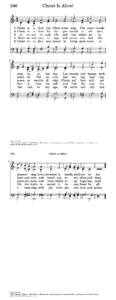 I’m glad we sang in our church “Christ Is Alive,” #246 in Glory to God, the PC(USA) Hymnal, which was written for Easter Sunday, 1968, by United Reformed Church minister and hymn-writer Brian Wren. It was penned for that hard late-60s Easter a few days following the assassination of Rev. Dr. Martin Luther King. It sings of the historical reality of the resurrection of Christ and, perhaps like Wesley’s famous “Christ the Lord is Risen Today” speaks of Christ alive now, alive in the present tense.
I’m glad we sang in our church “Christ Is Alive,” #246 in Glory to God, the PC(USA) Hymnal, which was written for Easter Sunday, 1968, by United Reformed Church minister and hymn-writer Brian Wren. It was penned for that hard late-60s Easter a few days following the assassination of Rev. Dr. Martin Luther King. It sings of the historical reality of the resurrection of Christ and, perhaps like Wesley’s famous “Christ the Lord is Risen Today” speaks of Christ alive now, alive in the present tense.
“He comes to claim the here and now and dwell in every place and time.”
And then, according to C. Michael Hawn,
Stanza four is the touchstone for the King assassination – the place where Dr. Wren brings the resurrection into contact with human suffering as expressed in racism, war, and all the ways that we hurt and destroy our fellow human beings. This resurrected One “suffers still yet loves the more” in the midst of the devastation that we bring upon each other.
The final stanza comes full circle and refocuses us on the “good news to this and every age.” The cosmic joining of heaven and earth is explicit here: “till earth and all creation ring…” The cosmos rings with the fullness of the good news of “joy and justice, love and praise.”
FOREST FULL OF WOLVES
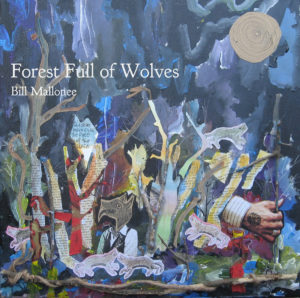 I haven’t followed much of a serious Lenten practice this year and I regret not being more disciplined or focused. But what I did do was listen almost exclusively to the latest album by Bill Mallonee, Forest Full of Wolves over and over. (You can order it, and so much more good music, directly from him.) It is, at first, dreary almost to the point of being devastating, and I intentionally wanted to spend time with its jangly, (beautifully) distorted guitar riffs that do Neil Young better than Neil himself, its piercing guitar obbligatos that could be mistaken for Mark Knopfler, the reverb and the whispered words, the whining, the down-and-out storytelling, the raw lament and dark protest of a world gone haywire. What do you expect from a CD where the first song darkly observes “shadows move over the face of the clock” and the second sings about “In The New Dark Age” and the last is a (Dust-bowl-era?) story about an old beat-up Ford? (“We had Jesus on the dashboard/ but that may not be enough” and the chorus offers, sadly, “I’m sorry.”)
I haven’t followed much of a serious Lenten practice this year and I regret not being more disciplined or focused. But what I did do was listen almost exclusively to the latest album by Bill Mallonee, Forest Full of Wolves over and over. (You can order it, and so much more good music, directly from him.) It is, at first, dreary almost to the point of being devastating, and I intentionally wanted to spend time with its jangly, (beautifully) distorted guitar riffs that do Neil Young better than Neil himself, its piercing guitar obbligatos that could be mistaken for Mark Knopfler, the reverb and the whispered words, the whining, the down-and-out storytelling, the raw lament and dark protest of a world gone haywire. What do you expect from a CD where the first song darkly observes “shadows move over the face of the clock” and the second sings about “In The New Dark Age” and the last is a (Dust-bowl-era?) story about an old beat-up Ford? (“We had Jesus on the dashboard/ but that may not be enough” and the chorus offers, sadly, “I’m sorry.”)
And so it goes, Bill’s big, wounded heart doing what he does, poetically reporting on what the album promo describes as a “scathing look at what created the debris of the American dream… (where) Mallonee’s characters inhabit a world of hardship and incongruity.”
As I listened to this album over and over these Lenten weeks I grew to take great comfort in the struggles and, perhaps not so oddly (knowing Bill’s art as I do) found hope there. I increasingly realized Forest Full… is as much an Easter album as a Lenten one. One reviewer wrote that the characters “still hold resolute in the face of an un-named darkness that haunts them within and without. By holding the smaller, specific shard of broken individual lives up to the light, he has created an arresting album of beauty, tenderness, and fragile-ness stocked with rock and roll convictions.”
I would take me too far afield to explore the signs of life in the seemingly dark, rootsy, Americana album, but between the lines, among the heartache, in each and every song, even in the wailing electric guitar, there are glimmers of redemption, joyful notes, wit and goodness. And hope.
In one catchy melodic tune – it could have been off his classic, fun, Summershine album, maybe – there’s a song alluding to the old gospel tune, “Trimmed and Burning.” No matter if no one sees your witness, “that beautiful sight,” he inspires us to be ready, waiting, and actively so. “Put on your boots and roll up your sleeves,” he sings, as he calls us to offer “an olive branch to the world.”
Here after Easter I wonder what it means to live like that, ready, waiting, active, a peacemaker.
N.T. WRIGHT
You may tire of me saying it, but N.T. Wright is one of the great authors who can help us exactly with that. I’m reading his new book biography of Paul (Paul: A Biography published by HarperOne; $29.99) and, as I’ve said before, it is big but really interesting.
Two of his major hardback books — one on the cross and one on resurrection, perfect after Easter for resurrectionary living — have recently been released in paperback and I simply must remind you of them now.
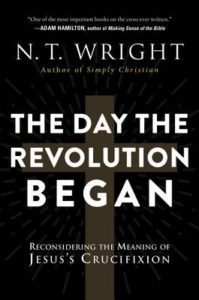 The Day the Revolution Began: Reconsidering the Meaning of Jesus’ Crucifixion N.T. Wright (HarperOne) $18.99 This is the one I raved about here (when it first came out) because it powerfully studies every key text in the New Testament about the cross and asks how these passages and their teaching relates to the coming Kingdom of God. That is, if “new creation” is the point of Christ’s death and resurrection, then how does his blood shed and the atonement help get us there? This is really, really good and a very valuable approach. Even if you aren’t convinced of all his deep exegesis, this book is very well worth reading. Now that it is paperback, it’s a great addition to your library.
The Day the Revolution Began: Reconsidering the Meaning of Jesus’ Crucifixion N.T. Wright (HarperOne) $18.99 This is the one I raved about here (when it first came out) because it powerfully studies every key text in the New Testament about the cross and asks how these passages and their teaching relates to the coming Kingdom of God. That is, if “new creation” is the point of Christ’s death and resurrection, then how does his blood shed and the atonement help get us there? This is really, really good and a very valuable approach. Even if you aren’t convinced of all his deep exegesis, this book is very well worth reading. Now that it is paperback, it’s a great addition to your library.
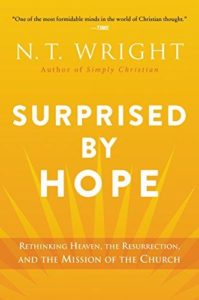 Surprised by Hope: Rethinking Heaven, the Resurrection, and the Mission of the Church N.T. Wright (HarperOne) $15.99 Many have said that this book is their favorite of Wright’s and its orthodox commitments and its innovative argument for creation regained is eye-opening and life-changing. We are so glad this is now out in paperback and hope it is widely used in study groups and book clubs. I assume most BookNotes readers know of its importance, especially in showing the grand vision of the restoration of the cosmos prefigured in the bodily resurrection. The implications are vast and he points us in the right direction, in much detail, with much vigor.. Now it is available for the first time in a more affordable paperback. Thanks to God.
Surprised by Hope: Rethinking Heaven, the Resurrection, and the Mission of the Church N.T. Wright (HarperOne) $15.99 Many have said that this book is their favorite of Wright’s and its orthodox commitments and its innovative argument for creation regained is eye-opening and life-changing. We are so glad this is now out in paperback and hope it is widely used in study groups and book clubs. I assume most BookNotes readers know of its importance, especially in showing the grand vision of the restoration of the cosmos prefigured in the bodily resurrection. The implications are vast and he points us in the right direction, in much detail, with much vigor.. Now it is available for the first time in a more affordable paperback. Thanks to God.
EUGENE PETERSON
While we are offering resources on this topic of living well in the resurrection even as we know the world remains broken and alienated, we surely should suggest two that seem perfect for this post.
 First, there is the short, lovely, wise, and useful little book called Living in the Resurrection: The Risen Christ in Everyday Life by Eugene Peterson (NavPress; $17.99.) This is my favorite book on what we call the “post-resurrection appearances” of Jesus, which includes a chapter called “Resurrection Wonder”, another called “Resurrection Meals” and a third called “Resurrection Friends.” Each is a reflection of Biblical text and he naturally draws out a particular spiritual practice from each. He shows how every day can be a Resurrection Day as we encounter the risen Christ and a formed in His ways by his presence among us.
First, there is the short, lovely, wise, and useful little book called Living in the Resurrection: The Risen Christ in Everyday Life by Eugene Peterson (NavPress; $17.99.) This is my favorite book on what we call the “post-resurrection appearances” of Jesus, which includes a chapter called “Resurrection Wonder”, another called “Resurrection Meals” and a third called “Resurrection Friends.” Each is a reflection of Biblical text and he naturally draws out a particular spiritual practice from each. He shows how every day can be a Resurrection Day as we encounter the risen Christ and a formed in His ways by his presence among us.
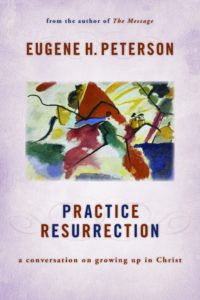
And then there is the much more hefty study of post-resurrection life that Peterson did by way of insight reflection on Ephesians as the last volume in his majestic five book “spiritual theology’ series. It is called Practice Resurrection: A Conversation on Growing Up in Christ (Eerdmans; $18.00.) This whole series are among the more enduring, intelligent spiritual writing of our lifetime, and this exploration of what it means to become mature in Christ is exceptional. Who couldn’t benefit for a calm and reasoned, yet passionate, look at how Ephesians invites us to a transformed life with God.
BRAND NEW – DIANA BUTLER BASS
Here is a brand new book that certainly will be talked about this Spring and just may the study for you this season after Easter. I haven’t read it carefully yet – it is just arriving this week – but I am sure you’d want to hear about it. Consider it an ideal book for reading “between the times” of already and not yet. Christ is risen, and we are glad. But what shape does that gladness take? And does it matter, really, that we have some deep thankfulness about our faith?
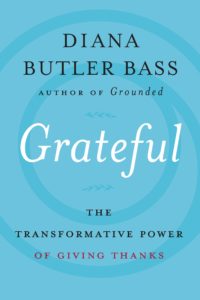 Grateful: The Transformative Power of Giving Thanks Diana Butler Bass (HarperOne) $26.99 I have written often about Diana Butler Bass, a fine scholar of religion, a student of and reporter about healthy congregational life, and a memoirist whose book about being formed by various Episcopal churches (Strength for the Journey: A Pilgrimage of Faith in Community) has recently been updated and re-issued.
Grateful: The Transformative Power of Giving Thanks Diana Butler Bass (HarperOne) $26.99 I have written often about Diana Butler Bass, a fine scholar of religion, a student of and reporter about healthy congregational life, and a memoirist whose book about being formed by various Episcopal churches (Strength for the Journey: A Pilgrimage of Faith in Community) has recently been updated and re-issued.
I really, really liked (despite a few minor disagreements) her excellent and beautifully-written last book Grounded: Finding God in the World – A Spiritual Revolution (HarperOne; $14.99) It was another wonderful voice in the growing contemporary choir singing “For the Beauty of the Earth” and insisting that knowing God and following Christ, empowered by the Spirit is, in fact, a very down-to-Earth thing. Whether one starts with the goodness of the shalom God created in the primal Genesis narrative or the very material nature of the incarnation or the promised restoration of creation offered in eschatological re-creation, Biblical people are people of the Earth. We are made in the image of a God who created and worked, placing humans – Earthlings might be a good translation of adama – in the Garden. We care about the Earth and we care about the ordinary stuff of real life. Faith enlivens us to the realities of life, and salvation is certainly not a escape route to a “better place” but is an empowerment to image God in Christ in the here and now.
Diana Butler Bass says all that very differently, and much more elegantly, than I do, at times, and my paraphrase of her project is only to whet your appetite for that very provocative, lovely, moving book.
But what does one write next, when one moves from a personal faith memoir to congregational life studies to impassioned writing about creation care and stewarding the public trust?

When I first heard that this was the topic of her research a year or two ago, I wondered if it was a good move. We need her blazing in critique of the status quo, her examination of churches that miss the point of the gospel, her ruminations on the implications of God’s great grace and love and the transforming power of the emerging and missional movements. Moribund mainline churches, especially, need her reminding us of ways to affirm a “faith for the rest of us” and how to engage the increasingly unchurched “nones.”
And, I’ll admit, as smart as Diana is, as impressive of her command of the sociology of the religious landscape is, I wondered if a book about gratitude was, well, a bit less urgent then her previous work. Maybe, I thought, it seemed a bit lightweight.
And that is just stupid on my part. I’ll admit it; what a dumb thing to think.
There are cheesy and simplistic books about gratitude – or prayer or kindness or hope or anything — and there are mature and thoughtful ones. Just because there are clichéd internet sites offering a positive thinking affirmation a day or inviting us to be happy no matter what, doesn’t mean that we don’t need more progressive and stimulating studies of the topic. I should know this about gratitude, because I’ve read some very impressive titles such as Radical Gratitude by Jo Leddy published by Orbis and one with the same title, Radical Gratitude by Ellen Vaugh, published by Zondervan. Some of our customers have been deeply moved by the mystic David Steindl-Rast who wrote Gratefulness: The Heart of Prayer.
Speaking of good books that may lead us to this topic, I am again reminded of the very impressive and theologically sound work of Mike Cosper who not long ago wrote the fabulous Recapturing the Wonder: Transcendent Faith in a Disenchanted World (IVP; $17.00.) It is hard to find gratitude in a “disenchanted” world, after all, which is why deeper studies like Jamie Smith’s How (Not) To Be Secular: Reading Charles Taylor (Eerdmans; $16.00) remain important for anyone wanting a deep level analysis of the roots of Western culture.
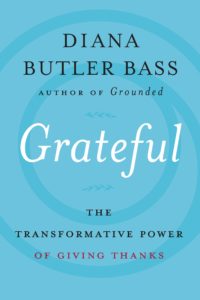 So, Diana Butler Bass has done a deep dive, as they say, into the nature of and value of gratitude. I am as eager as any to read this and admit that I need it more than most. I am glad she is a serious social critic and cares about not only individual happiness and personal meaning and resilience and such, but radical social reform and cultural renewal. In fact – surprise! – this is one of the great fruits of being people of gratitude; it is, she says, “what we most need now.” In Butler’s hands, I am sure, this virtue is not recommended as a sentimental or cheap pick-me-up by looking on the bright side. It is a profound spiritual practice that can be transforming and renewing and will help — if practiced — alter the politics of our time. In this regard, it is subversive.
So, Diana Butler Bass has done a deep dive, as they say, into the nature of and value of gratitude. I am as eager as any to read this and admit that I need it more than most. I am glad she is a serious social critic and cares about not only individual happiness and personal meaning and resilience and such, but radical social reform and cultural renewal. In fact – surprise! – this is one of the great fruits of being people of gratitude; it is, she says, “what we most need now.” In Butler’s hands, I am sure, this virtue is not recommended as a sentimental or cheap pick-me-up by looking on the bright side. It is a profound spiritual practice that can be transforming and renewing and will help — if practiced — alter the politics of our time. In this regard, it is subversive.
She has done some talks on this and a few early readers got early review copies and almost everyone is surprised to learn so much from Diana, and to come to understand how culturally-important and, yes, subversive, this practice can be when we learn it well and appreciate the political implications of this way of life. One who heard her commented, “Diana took everything I thought I knew about gratitude and turned it inside out.”
Gratefulness is, in fact, she argues, a civic practice. And she explains why in this book that one reviewer called “an intellectual cousin to Grounded.”
Here is how Butler Bass puts it, insisting that gratitude is “inherently social.”
Gratitude is an emotion we experience as individuals, and we can each practice gratitude as a personal ethic, the foundation of a good life. Yet gratitude is inherently social, it always connects us as individuals to others.”
Here is what her publisher says about her new work:
Just as she did in her award-winning book Grounded, Diana Butler Bass invites readers to understand new dimensions of American spirituality in Grateful.
Although most of us know that gratitude is good — and good for us — there is a gap between our desire to be grateful and our ability to behave gratefully. The implications of the gap are bigger than we realize, affecting both our personal and public lives. In Grateful, Bass weaves together social science research, spiritual wisdom, and contemporary issues as she calls for a richer understanding and practice of gratitude. What emerges are surprising insights about the power of thankful living to change how we treat one another, and how we might transform our world.
Here is a very recent interview with Diana conducted by Catherine Woodiwiss for Sojourners.It is very good. Reading this fascinating conversation you’ll realize what motivated Diana to research this book and what she discovered as she wrote. And, I believe, why it is important for us today. I hope it inspired you to order it from us soon.
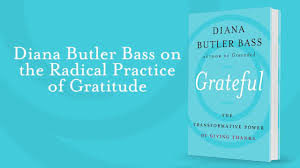
You can order Grateful: The Transformative Power of Giving Thanks here at BookNotes at 20% off ($21.59) now, by using our secure order form page.
And, as always, we are grateful for those who send orders our way.
BookNotes

SPECIAL
DISCOUNT
ANY ITEM MENTIONED
20% Off
order here
this takes you to the secure Hearts & Minds order form page
just tell us what you want
inquire here
if you have questions or need more information
just ask us what you want to know
Hearts & Minds 234 East Main Street Dallastown PA 17313
read@heartsandmindsbooks.com
717-246-3333
